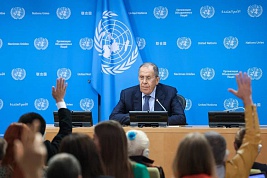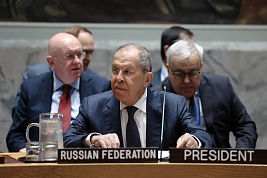Response by Russian MFA Spokesman Andrei Nesterenko to a Media Question about Russian-American Contacts
Question: US State Department spokesman Sean McCormack has invited Moscow to put aside any issues on which the US and Russia do not see eye to eye and to work in areas where our countries can cooperate, for example, on Iran. How would you comment on this approach?
Answer: We have always been opposed to making our relations hostage to differences of opinion on individual issues. But the American side's position needs clarification in this regard. What does it understand by "other issues"? We stand ready to work on Afghanistan, but at Washington's insistence the activities of the Russia-NATO Council have been frozen, where the Afghanistan problem is one of the central. How are we to understand the blocking by Washington of a whole array of Group of Eight events planned by the Japanese presidency, including the meetings of the Rome/Lyons Group on terrorism and organized crime, the Group of Nonproliferation Experts, the agriculture ministers on food security and a serious of meetings within the Heiligendamm Process where the G8 interacts with its traditional dialogue partners – China, India, Brazil, Mexico and South Africa. The broad range of this kind of themes, where you witness a high degree of commonality of interests, including, by the way, the Iranian nuclear program, has traditionally served as the subject of consideration at the G8 foreign ministers' meetings held annually on the fringes of UN General Assembly sessions in New York. Such a meeting will not take place this year, again, we understand, at the insistence of the US. Also subjected to rigid politicization by the US are such issues as Russia's entry into the WTO and OECD, which Secretary of State Condoleezza Rice openly declared in her "almost Fulton speech" on September 18 in Washington.
While suspending a whole array of multilateral forums on a broad agenda, the US is at the same time seeking an urgent meeting of the Six on the Iran question.
Of course, we are committed to all the existing accords on Iran and will continue to work towards common goals, although there are tactical differences between us. Let us recall the remark of President Medvedev at his meeting with the Valdai Forum participants on September 12 that new sanctions against Iran would be inopportune, since real chances exist for further diplomatic work. The IAEA also confirms this and the decisive say in "nuclear affairs" belongs to it. We see no "fire alarm" that would require us to put off other things in the extremely busy week of the UN General Assembly and meet urgently on the Iranian nuclear problem. On the contrary, there are far more burning issues – for example, the situation in Afghanistan and on the Afghan-Pakistani border – but our western partners are not in a hurry to collectively discuss this problem for some reason.
We would very much like that Washington would, at last, make up its mind as to just what they want from relations with Moscow. If they want to "punish" Russia, that is one thing. If they agree that we have common interests that need to be jointly promoted, then it's a different story. But, to paraphrase Condoleezza Rice's words, "You can't have both."
September 23, 2008


